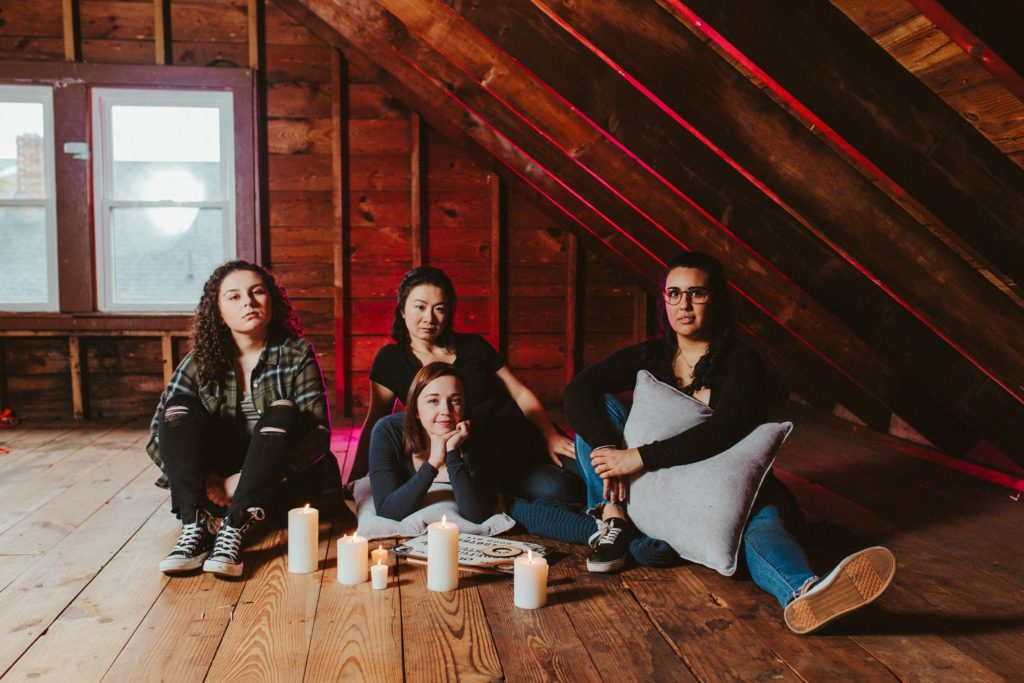
Photo by Ally Schmaling. — with Gina Fonseca, Khloe Alice Lin, Lisa Joyce and Tatiana Isabel.
Presented by Off the Grid Theatre Company
Written by Alexis Scheer
Directed by Rebecca Bradshaw
August 17 – September 1, 2018
Calderwood Pavilion
Roberts Studio Theatre
Boston Center for the Arts
527 Tremont St. Boston, MA 02116
Off the Grid on Facebook
Review by Diana Lu
(Boston, MA) It is 2008, a momentous year for the United States, and especially for four teenage girlfriends in suburban Florida. This radical, ambitious, creative squad grapples with identity, relationships, and adult responsibility using the occult as a metaphor…or is it anything but?
I really appreciate this play’s subject matter and what it is trying to accomplish, and I am looking forward to future works by the playwright. I can tell that Scheer is a highly intelligent, informed person with a great deal of cogent insight on America’s social, cultural, and political landscape. The witty humor of the script was also highly enjoyable. Particularly, Lisa Joyce (Zoom)’s comedic timing and adroit performance lent a textured realism to her character. Unfortunately, little else in this production translated dramatically.
So much happens in the play, both onstage and off: A séance, a memorial, a pregnancy scare, an interpretive dance number, just to name a few. Watching it, however, felt like nothing was happening. None of the offstage events informed the dramatic action. These were significant events in the characters’ lives, but none seemed to impact the characters’ emotions onstage or progress the narrative. The dialogue was dominated by intellectual mini-monologues that hit on a lot of interesting social topics, but that just didn’t sound believable. One particularly cringe-worthy representative line went something like: “If abortion were this easy it wouldn’t be a national debate!”
The relationships between the characters didn’t seem realistic either. It’s been a while since I was a suburban high school student, but looking back at my experiences, I can tell you that there wouldn’t have been this sort of easy, race-blind, classless camaraderie in the fancy suburbs. I can tell you that a squad of girls like this, if they ever had a chance to be friends, would have broken up by middle school. I can tell you that a young woman who slept with her best friend’s boyfriend would not be forgiven with an “I’m sorry” and a secret handshake. There would have been blood, tears and slut-shaming. For the transgressor to have been a woman of color, there would have been heightened, racialized slut-shaming. That single event, the fact that a boy left a white woman who wasn’t “putting out” to sleep with a (likely hypersexualized) Asian woman, is a problematic social dynamic that would be worthy of being dissected in its own play.
The most engaging scenes were the tender moments between Kit and Pipe, primarily because Kit was played with disarming vulnerability. I wanted so much more of these two and their budding relationship. I wanted to know all four of these young women on a much deeper level. What was it like for this young Asian woman whose father had committed suicide? I have a friend like this, who fell into a deep depression in college, but came out stronger and with a much closer relationship with her mother. Why does this young Jewish woman yearn to have a child? Does it have anything to do with her hearing loss? Is she using sexuality as a desperate play for purpose because her increasing handicap makes her fear obsolescence in an ableist society? Show me two Latina girls falling in love in stolen moments in a sweltering treehouse, and let the one girl speak of what it felt like to lose her lover.
I wanted to see the dynamic tension of Pipe’s conservative values against her dark ambitions and against the elemental imperative of desire for her sacrificial lamb. I wanted to see it play out both internally, and between her and Kit. I wanted to hear the girls talk about their lives and how they feel about themselves, their families, their relationships with boys and girls and each other. I would have gladly had any one of these storylines take focus, but every time one of them got close, the subject was changed, the scene interrupted. I felt like I was watching a string of non-starts, which made it seem like the play was trying to highlight every topic at once because it was too scared to expose the private, visceral truth of a single one. This play wanted to say so much that it ended up not saying anything.
[Spoiler Alert] What I found most disheartening was that this ostensibly feminist story still revolved around young women’s idolization of adult men, then ended abruptly with an alpha male coming onstage to mansplain the core concepts of the play to the audience. To me, the irony of the situation was bitter and tragic. It makes me realize that we still have such a long way to go as women, particularly women of color, in defining ourselves and portraying our own stories. How do we even start when narratives centered around men, particularly white men, are all we’ve ever been fed and imbued with, when those are the stories inside us? To echo one of Kit’s best lines, how can I take down the patriarchy when I am the patriarchy?
